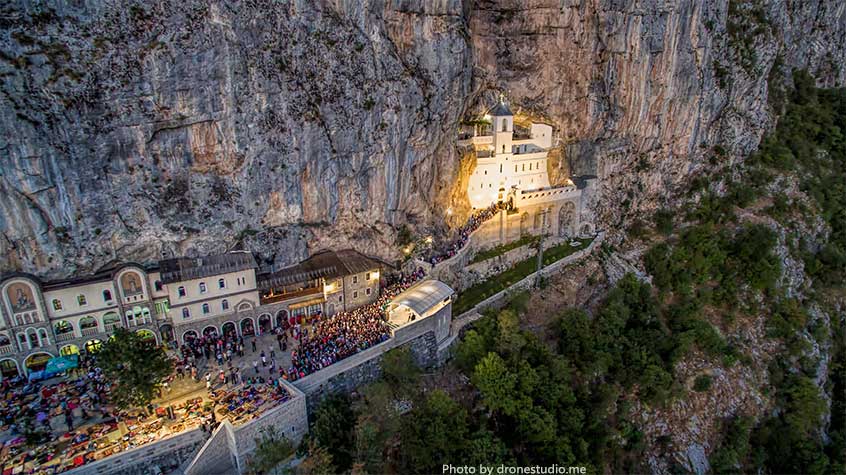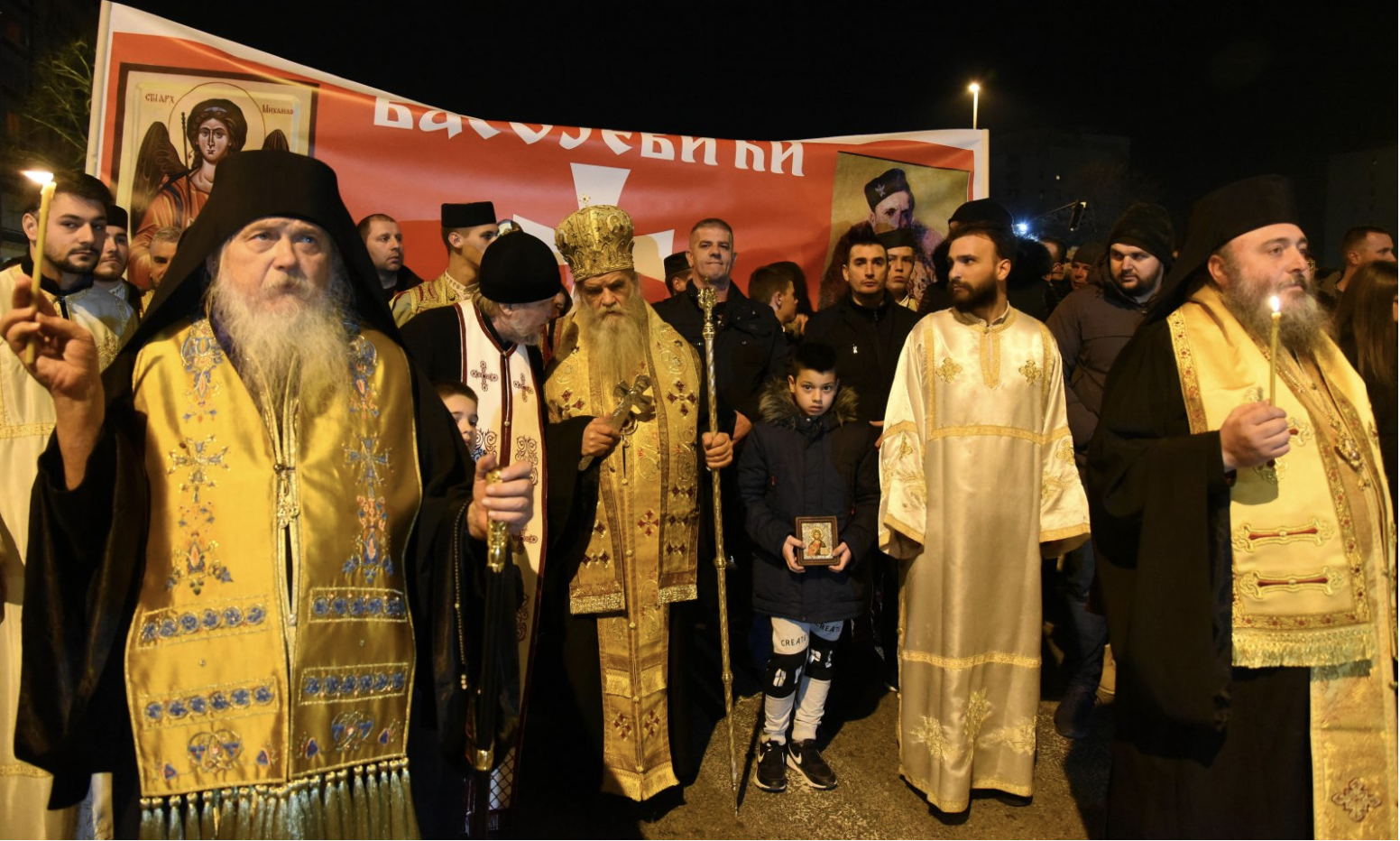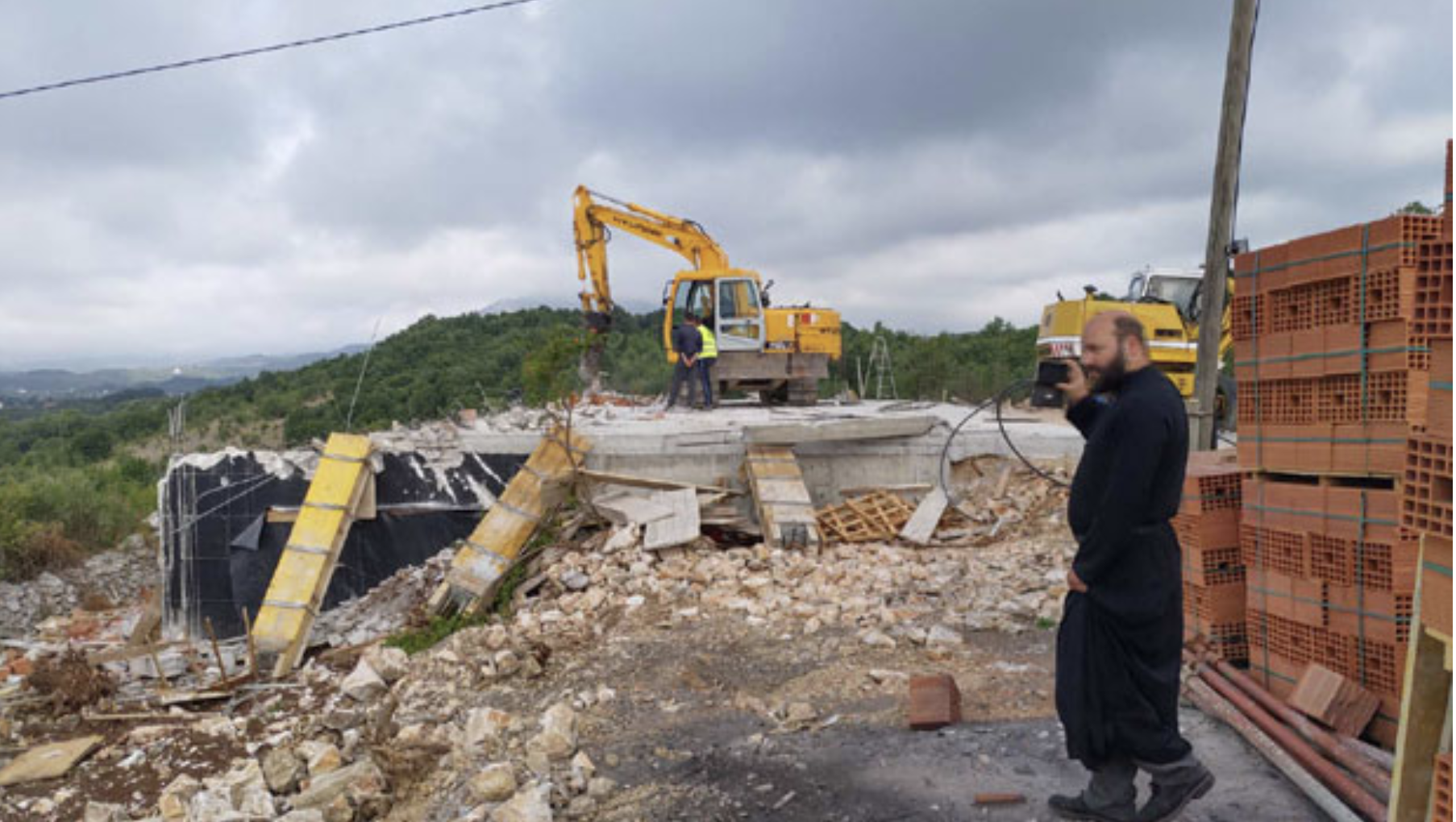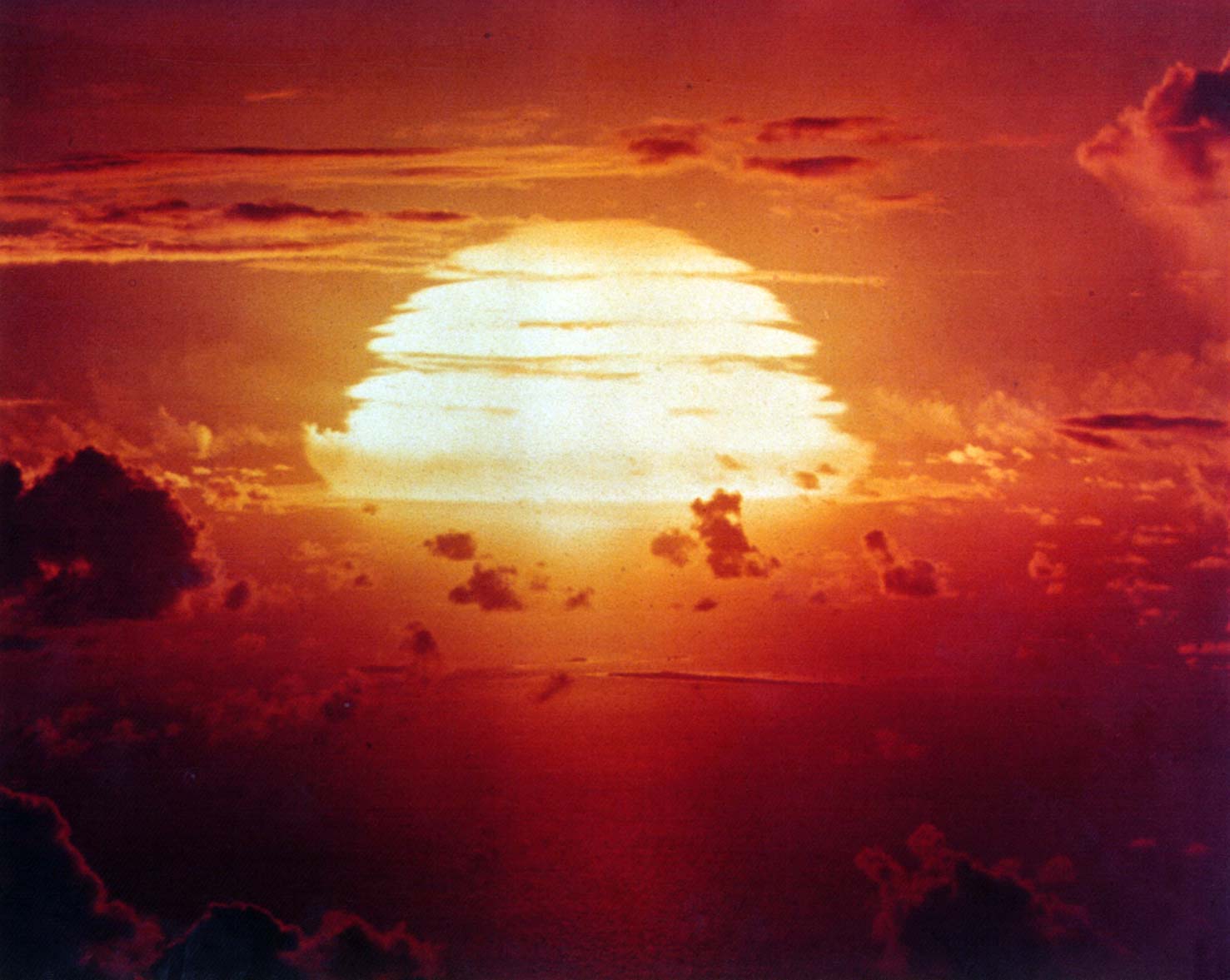In an otherwise scenic coastal city surrounded by rocky, lush terrain and buzzing with tourists, smoke and chaos consumed Budva, Montenegro as a clash between police and demonstrators ensued. On June 17, 2020, Montenegro’s police and SAJ (Special Anti-Terrorist Unit) raided the government municipality building of Budva.
Their primary instruction was to disperse the “opposition” demonstrators and arrest Mayor Marko Carević. Hundreds of demonstrators had gathered in front of the municipal building to protest President Milo Ɖukanović’s uncovered hush deal that tipped the municipality’s majority in favor of Ɖukanović’s DPS Party (Democratic Party of Socialists), forcing incumbent Mayor Carević out in the process.
In 2016, a coalition between the DF (Democratic Front) and Democratic parties had secured a majority in Budva’s municipality, placing the oversight of Montenegro’s thriving tourist city under the control of Ɖukanović’s most vociferous political opponents. Carević, elected as mayor from the DF party, saw his short-lived tenure as mayor come to an abrupt end after Ɖukanović bribed a DF Party councilor to switch parties.
When it came time to transfer power to Nikola Divanović, Ɖukanović’s newly appointed mayor of Budva, Carević, refused to step down, calling it an unfair, undemocratic political selection process. Carević’s refusal led Ɖukanović to order the police and SAJ to forcefully take him down, inciting demonstrators across Budva to stand in front of the municipality building in solidarity with Carević. As police started making their arrests, what started as a peaceful protest and stand-down escalated to an abhorrent example of police brutality.
Among the arrested were: Carević, Manager Milo Božović, Secretary of Investments Mladen Mikijelj, Chief of Cabinet Nikola Jovanović, and Advisor Ɖorđe Vujović. There were dozens more injured, experiencing acts of overt overuse of force. An officer kneeled on Mikijelj’s neck despite his being in handcuffs and showing no signs of resistance. Vujović was thrown down cement stairs and had to be hospitalized for serious spine injuries.
The chaos in Budva did not end there. Eight days following the raid on the municipality, police threw tear gas at Serbian children who were at basketball practice.
However, the incidences of police brutality filmed in Budva are far from being isolated events. They are a part of a longstanding history of Ɖukanović forcefully targeting, silencing, and intimidating his political opponents, whom he has collectively and strategically termed “pro-Serb and Russian” forces. Ɖukanović’s terror has turned to outright political oppression and in many instances, even ethnic and religious discrimination and persecution of Serbs.
In 2015, a few months before Montenegro’s general elections, thousands of demonstrators peacefully assembled in the capitol of Podgorica, demanding Ɖukanović’s resignation from politics. After nearly thirty years in “public service,” Ɖukanović had been accused of corruption, including voter fraud, organized crime, nepotism, cronyism, and kleptocracy. Ɖukanović was even named 2015’s “Man of the Year in Organized Crime and Corruption” by the Organized Crime and Corruption Reporting Project (OCCRP).
Then, like now, the Montenegrin police and SAJ unduly arrested and beat demonstrators in hopes of dispersing them. Since then, Montenegrin watchdog and human rights groups have urged for the dissolvement of the SAJ, claiming that their training makes them ill-equipped to peacefully handle demonstrations.
Yet, the police and SAJ continue to harass and terrorize demonstrators, breaching their powers and committing severe human rights violations without any repercussions. Largely serving as their protector is Ɖukanović, who is suspected of intimidating and incentivizing the Montenegrin police and SAJ into acting as an “anti-opposition” force. As Boris Raonić, Director of the Civil Defense watchdog group explained, “The [SAJ] continue to use excessive force…with no responsibility for their actions; they obviously enjoy political protection.” Former SAJ member Brajusko Brajusković added, “The SAJ has been used to beat up opponents of the regime, journalists, and opposition leaders [on behalf of Ɖukanović] since the late 90s.”
Ɖukanović’s political alliances extend beyond his close relationship with Montenegrin police and SAJ. Greatly contributing to Ɖukanović’s one-party, autocratic rule is the continued support of the West, largely led by the US.
A Political Strategy: Securing a Western Alliance
2015 proved to be an exceptional year for Montenegro. Exhausted by Ɖukanović’s tainted political legacy, demonstrators laid the foundation for what has since then become a large opposition force.
Faced with a serious threat and disruption to his long reign, Ɖukanović had to muster a propaganda campaign to delegitimize the opposition. Such a propaganda campaign constituted a “pro-Serb and Russian,” anti-West enemy that would unequivocally legitimize Ɖukanović’s re-election and achieve recognition by the then-allied West.
Nevertheless, Ɖukanović’s friendly alliance with the West is a recent phenomenon of the 21st century. In the early 90s, Ɖukanović entered politics under the influence of Slobodan Milošević, the former president of the Socialist Republic of Serbia and later president of the Federal Republic of Yugoslavia. However, after becoming heavily entangled in crime and corruption charges, Ɖukanović realized that critical to his desired one-party rule and kleptocracy was the support of the world’s largest collective power: the West.
Thus, in a span of just fourteen years, Ɖukanović has successfully campaigned for Montenegro’s 2006 independence from the former Federal Republic of Yugoslavia, 2017 NATO entrance, and candidacy in the EU. Throughout this process of “Westernization,” Ɖukanović has earned the advice and respect of Western colleagues, including the Obama administration. As the US Ambassador to Montenegro, Judy Rising Reinke, noted: “[Montenegro’s] historic accession to NATO has solidified [the US-Montenegro] partnership as allies.”
After carefully establishing a close “partnership” with the West, Ɖukanović has accused the demonstrators of being “pro-Serb and Russian” and anti-west to delegitimize their assembly. Since 2015, the Montenegrin protests continued to grow, even escalating into the 2018-19 “Balkan Spring,” with hundreds of thousands of demonstrators across the Western Balkans protesting the autocracies of their respective states. Indeed, there is some truth to Ɖukanović’s “pro-Serb and Russian” allegations. More than a third of Montenegrins identify themselves as ethnic Serbs, while 88 percent of Montenegrins are members of the Serbian Orthodox Church. Nevertheless, Ɖukanović’s “pro-Serb and Russian,” anti-West rhetoric is really meant to “capitalize on the West’s anxieties over Russia’s attempts to cement its traditional Balkan alliances in Serbia and Montenegro.” By manufacturing an anti-West enemy, Ɖukanović is aware that he can commit voter coercion and fraud, maintain power, and still be perceived as a legitimate, respected, and even admired leader by the West.
Contrary to Ɖukanović’s allegations, the “pro-Serb and Russian” opposition are not conspirators seeking to undermine Montenegro, but rather individuals seeking to finally actualize democracy in Montenegro. Nevertheless, an anti-West sentiment does exist among Ɖukanović’s opposition, although not for the reasons falsely perpetrated by Ɖukanović and his Western allies. The opposition’s hesitation lies in the lack of economic stability and government transparency promised by the West. Instead, the West has proven more interested in securing geopolitical, military alliances, even at the expense of its democratic promises.
There is evidence to bear on the West’s tainted campaign and intervention in Montenegro. During the 2016 general elections, Ɖukanović’s DPS Party barely secured more seats than the opposition after a plethora of evidence hinted at vote-buying and voter fraud. With the size of the opposition, it is estimated that during the 2016 general elections, the opposition really secured 40 parliamentary seats while Ɖukanović’s DPS Party only secured 36. However, due to bought, fake ID cards and voter coercion through money, job, and travel offers, the DPS Party ended up winning more seats. Videos showing DPS members coercing Montenegrins from the Yugoslavian diaspora with travel offers were leaked on the internet. From Montenegrins in the diaspora alone, Ɖukanović’s DPS Party secured 6,000-7,000 extra votes, or two parliamentary seats. Given such voting violations, several watchdog groups filed over 114 criminal complaints against the DPS Party to the Montenegrin Prosecutor’s Office and the International Office for Democratic Institutions and Human Rights. The respective DPS-run, Western-biased offices, without a thorough investigation into the charges, concluded that there were no “violations of freedom of choice in voting” and that the elections were “generally free.”
After the West turned a blind-eye from Ɖukanović’s gross voting infringements during the 2016 general elections, Ɖukanović and his DPS Party were quick to repeat their same violations during the 2018 general elections. Again, after propagating information about a “pro-Serb and Russian,” anti-West opposition, Ɖukanović’s election as president was quickly recognized and approved by the West. Ultimately, Ɖukanović’s “pro-Serb and Russian conspirators” allegations came at a pivotal moment of growing dissent against him in Montenegro, implying the true motives behind Ɖukanović’s pro-Western campaign and rhetoric. In order to appease the Western powers, Ɖukanović continues to maintain his pro-Western campaign and rhetoric, leading to his continued rule of Montenegro that the Western powers uphold.
The Ethnic and Religious Discrimination and Persecution of Serbs in Montenegro
Understanding how integral Ɖukanović’s ethnically and politically divisive campaign and rhetoric is to his overall success illuminates the motives behind the DPS Party’s ethnic and religious discrimination and persecution of Serbs in Montenegro.
On December 27, 2019, the DPS-majority Montenegrin Parliament approved the ironically named Law on Freedom of Religion or Belief and the Legal Status of Religious Communities. Under the law, the Serbian Orthodox Church has to prove ownership of property dating before 1918. On this day, the Kingdom of Montenegro joined the Kingdom of Serbs, Croats, and Slovenes after the First World War. Ɖukanović and his DPS Party are using this history as grounds to acquire state ownership of religious property, violating the common democratic tenet of “separation of church and state.”
The Serbian Orthodox Church owns 66 monasteries and dozens of churches in Montenegro, most of which date to the Middle Ages. Among them, Ostrog Monastery remains the most important and famous, attracting nearly one million Orthodox, Catholic, and even Muslim religious followers every year. Housed in the monastery is St. Basil: born to Serbian parents, he dedicated himself to an ascetic, religious life as a monk. After Ottoman Turks destroyed Tvrdoš Monastery, St. Basil was forced to move to Ostrog. There, St. Basil spent the remainder of his life expanding the Serbian monastery and performing religious miracles. When he died, his perfectly preserved body was moved to a cave, where it remains to this day. However, following his death, “the site of Ostrog and St. Basil’s relics have had to be defended many times in the last 300-plus years.”

The most recent attack on Ostrog Monastery coincidentally came on St. Basil’s birthday, December 28, when Ɖukanović signed the parliament-passed legislation on Freedom of Religion. Despite the close history between the Serbian Orthodox Church and Montenegro’s monasteries and churches, Article 62 of the law does not explicitly describe how church property ownership can be proven.
As Montenegrin political analyst and journalist Boris Marić explained, “The legal text itself contains a number of legal illogicalities, vagueness, and conflicts of law. This is especially true when it comes to the issue of registration of religious communities, where no clear answer has been given and any discretionary decision has been removed as to who is obliged to register and who does not have that obligation.”
Another contentious issue regards the principles of constitutionality. Assistant professor of political sciences at the University of Belgrade, Milan Krstić, explained, “Property rights are guaranteed by international agreements signed and ratified by Montenegro, such as the European Convention on Human Rights and the Stabilization and Association Agreement. A simple transfer of church property built before 1918 into state ownership, made possible by this law, effectively nationalizes property that is not state property outside ordinary court proceedings, contrary to the opinion of the Venice Commission [advisory board of the Council of Europe].” Krstić added that the burden of proving such property ownership specifically targets the Serbian religious community, despite having the largest Montenegrin following, as other religious communities are protected by individual, special treaties.
The third major issue stems from a lack of justification regarding the public interest behind the retroactive nature of the law. Marić said, “In a situation where this law would be considered in practice as a lex specialis, it would, as written, produce a retroactive effect. In order for a legal text to have norms prescribing retroactivity, it must be enacted in a special procedure that would justify the public interest in introducing such norms into the country’s legal system.” Ɖukanović has failed to offer any logical justification for the Law on Freedom of Religion or Belief and the Legal Status of Religious Communities. Instead, he promotes the Montenegrin Orthodox Church that is widely unrecognized and barely came into existence in the 1990s, after the Serbian monk Antonije Abramović was defrocked.
Ɖukanović and the DPS Party’s legislative attack on Serbs has recently forced the Serbian Orthodox Church to protest Ɖukanović’s regime. Ɖukanović has used the Montenegrin police and SAJ to harass, arrest, and beat the clergy and religious protestors, disguising their discriminatory attacks as punishment for violating COVID-19 regulations. Except, tracing back Ɖukanović’s past offers an abundance of evidence that proves that Ɖukanović’s harassment of Serbs is not an isolated, reactionary response influenced by COVID-19 restrictions. Rather, it is yet another example of forceful and tragically legal ethnic and religious discrimination of Serbs. An incident on June 10, 2020 further proves that Ɖukanović’s discriminatory actions are unmotivated by COVID-19. Without any demonstrators present to incite a disguised reaction from Ɖukanović, clergy from Ostrog’s monastery watched as a section of the monastery was illegally destroyed. Montenegrin police and SAJ guarded the company ordered by Ɖukanović to destroy the religious property.


Unfortunately, while Ɖukanović and his DPS Party seek to undermine the Serbian presence in Montenegro, their actions are truly undermining every common Montenegrin citizen. Nearly 90% of all Montenegrins identify as belonging to the Serbian Orthodox Church. While many Montenegrins are nationally Montenegrin, their ethnic and religious identity and political beliefs are closely tied to Serbia and through that Serbia’s long-time ally Russia (hence Ɖukanović’s successful “pro-Serb and Russian conspirators” propaganda campaign and rhetoric).
Not only has Ɖukanović’s terror deprived most of Montenegro of ethnic and religious rights and protections, he has left most Montenegrins severely politically and economically disadvantaged. Ɖukanović’s autocratic, oligarchic, kleptocratic rule has deprived Montenegrins of fair political representation and the same levels of economic prosperity Ɖukanović and his family continue to enjoy.
Montenegro: The Story of a Crumbling “Democracy”
Milo Ɖukanović’s autocratic legacy demands international attention and scrutiny, especially as his political strategy will likely secure his concentration of power for years to come. In his wake, Ɖukanović leaves behind a complex story of corruption that can resonate with many other countries and world leaders, especially those of the Western Balkans. As Eastern European leaders succumb to the demands and pressures of an increasingly Westernized world, they paradoxically drive their countries further away from achieving the coveted “Western democracy” and closer to a state where democratic tenets are compromised. The ongoing police brutality used to perpetrate infringements on political, ethnic, and religious rights, exemplified by Ɖukanović’s regime, underscores the lack of freedom of speech and religion that plague Montenegro. More so, it highlights the determination of Ɖukanović’s Western allies to secure geopolitical, military alliances, even at the expense of truly bolstering and improving the conditions of the intervened country. Thus, the significance of police brutality is not rooted in the abhorrent human rights and democratic violations, but its symbolic nature and connection to a larger, crumbling society and infrastructure of autocratic states propagated and disguised as leading examples of “democracy.” The only way forward: protest, as seen by the hundreds of thousands of Montenegrin demonstrators. Their protests, inherently democratic, demonstrate how revolutionary collective action can be in ultimately bringing attention to pressing issues, sparking conversations, and setting the impetus for change.
Picture credit for cover photo: "Thousands in Montenegro March Against Religion Law" by Stevo Vasiljević.





